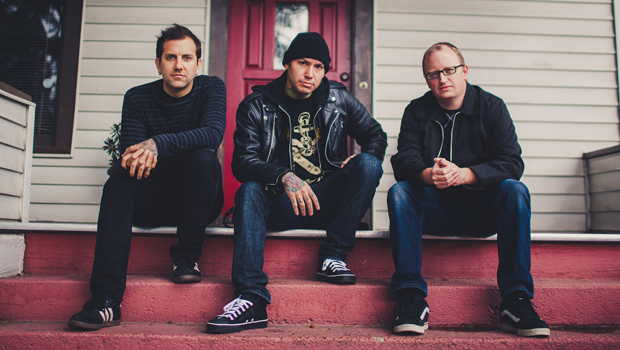Interview: Bassist and Frontman Mike Herrera on 20 Years of Life Lessons with MxPx
All the latest guitar news, interviews, lessons, reviews, deals and more, direct to your inbox!
You are now subscribed
Your newsletter sign-up was successful

Two decades, thousands of touring miles and many albums later, rock band MxPx embarked on their 20th anniversary tour this summer, shortly after the release of their ninth studio album, Plans Within Plans (Buy it on iTunes).
MxPx has sold more than 2.5 million albums worldwide during the course of their career. It’s been a fulfilling journey for bassist/vocalist Mike Herrera, guitarist Tom Wisniewski and drummer Yuri Ruley, but as detailed in the 2011 documentary Both Ends Burning, it hasn’t been without sacrifice and hardship.
Through it all, the band has maintained a very loyal fan base and continues to record and tour successfully without compromising the foundation on which MxPx began.
Prior to the launch of their 20th anniversary tour, Herrera reflected on the past, present and future of MxPx.
GUITAR WORLD: Were you ready for this 20 years ago? Can you ever be ready?
I definitely wasn’t, absolutely not. The whole business thing has always been an afterthought — maybe not in a good way, but an afterthought — about how we’ve run our band. In that regard, we’ve been behind in sort of having the best way of doing things business-wise, but ultimately the shows always turn out good and the people enjoy the music. We’re not the best businesspeople, but you’ve got to team up with other people that are.
You grew up in this band. Is it possible to hold on to some of those feelings of youth?
All the latest guitar news, interviews, lessons, reviews, deals and more, direct to your inbox!
It is. It’s weird sometimes, because when you’re in a band, you’re insulated from real life in a lot of ways, and a lot of that translates into us acting like kids instead of adults and the world seeing you as kids. I still have moments of not wanting to do anything I’m supposed to be doing, and I realize I’m a grown man and I should probably take care of some of these responsibilities. I think that creeps up on people in bands.
You see some bands that make a good run of it, but it becomes work, it becomes real work, and that’s usually when bands start to fall out. It’s hard to keep a group of people together with similar goals, for your individual goals and your collective goals. That’s probably one of the hardest things newer bands face in this market, especially where everything is so superficial and they don’t get a lot of time to get people involved with their music and deep into it. You have to hit people real quick, right away.
We always put out records and we don’t have huge hit songs, but we have fans who know all the songs on our records. That changed with digital singles. We still put out records, but we feel you have to put stuff out in between, whether it’s an EP or a cover album or just a single somewhere.
At some point you wish you were grown up, at least I do, because when I’m around my normal friends I feel totally normal, but I go to a career event where there’s all these serious people doing serious things, and I don’t feel like I’m not doing something seriously; it just makes me want to take what I do a little more seriously, like yes, it’s music and it’s fun, but it also can be something that I don’t think is a bad thing to take seriously.
What we’re trying to say in the music — I don’t take that too seriously, but at the same time, we started out as kids and our songs started out silly and fun. We got more serious, but not in a way that isn’t still fun for people to listen to.
When you feel the pressure to put content out to keep the name active and give something to the audience because attention spans are so short, how do you do that and keep the quality and the integrity?
I think about what are they ready for and what do they want to hear. I write with that in mind. Everything else is extra, in my opinion. I’m not looking at it from a business standpoint. I’m looking at it like a legacy thing. What am I going to add to the catalog of MxPx? At the same time, I refuse to be pressured. If I feel it’s a good song, I’ll put it out. Beyond that, it doesn’t need to go into committee. The fans are the committee.
You’re labeled as a punk band. Is that accurate? What does that mean?
Obviously, there’s a lot of different kinds of punk music. MxPx people know what we sound like, but at the same time it’s been that typical, “Let’s put out our poppiest song as a single” kind of thing, which makes sense, but it doesn’t truly represent what we sound like live and on the record.
Now we’re making all of our own decisions. I’m doing all the major management decisions and I have people that help me out with day-to-day stuff, so I feel much better about the decisions that have been made. As far as deciding singles with the new album, I was like, “We have to go with something that represents what this record is now, not what people expected from MxPx in the past.” So we went with something not really radio friendly or video friendly [“Far Away”].
We went with a hard-hitting, almost hardcore-sounding punk song right away, and it did exactly what I was hoping, which was people loved it. They never mentioned that it wasn’t radio friendly or that it was a weird single. They just liked the song, and I feel like, man, I wish I was doing it from the very beginning of our career instead of letting managers and labels coerce me into this single and that single and “Why don’t you write a few more songs?” and “No, that’s not a single either.”
People are always so indecisive, and I was as well growing up, because you feel that you’re the young kid and these adults in your life that are managers and tour managers and label people and A&R people should know the right answers.
Now that I’m a little older, I can look back on it and realize that just because they’re older than me doesn’t mean they have the right answers. I can respect people for their age or where they’ve been in life, but no one knows what’s right for you except you. That’s something I’ve learned over the years.
How long did it take you to figure that out?
About 19 years! I’ve been slowly adding these life lessons. I think I’m somehow figuring life out a little bit more in my 30s, and that reflects on how I do business with the band, so I think that’s a good thing.
Keep up with MxPx at their Facebook page and official website. Buy Plans Within Plans on iTunes here.
— Alison RichterAlison Richter interviews artists, producers, engineers and other music industry professionals for print and online publications. Read more of her interviews right here.Photo: Jeff Newsom
Alison Richter is a seasoned journalist who interviews musicians, producers, engineers, and other industry professionals, and covers mental health issues for GuitarWorld.com. Writing credits include a wide range of publications, including GuitarWorld.com, MusicRadar.com, Bass Player, TNAG Connoisseur, Reverb, Music Industry News, Acoustic, Drummer, Guitar.com, Gearphoria, She Shreds, Guitar Girl, and Collectible Guitar.
